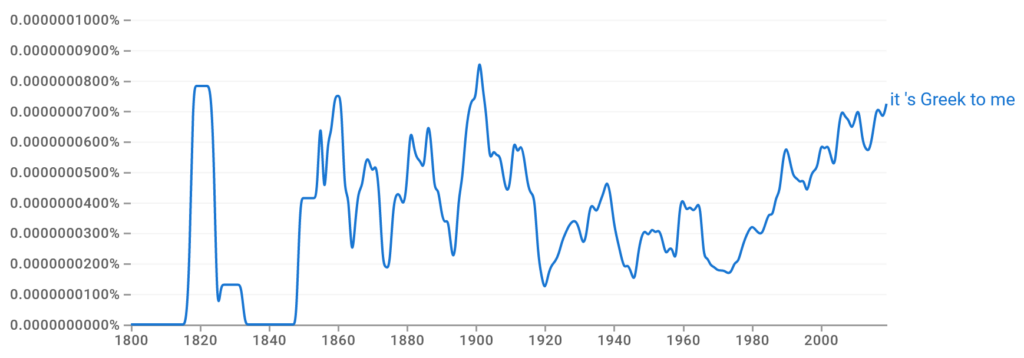It’s all Greek to me is an idiom used to convey that something is completely incomprehensible or confusing. When someone says, “It’s all Greek to me,” they mean they cannot understand or make sense of a particular subject or situation.
Idioms like this are phrases used figuratively to exclaim something or to make a strong point without using their literal definition. They are often used to add detail and interest to speech and writing. Learning how to use idioms can help you master the English language.
This article explores this idiom’s meaning, origins, and how to use it through various sentence examples. I also include a quick quiz at the end to test your knowledge. Keep reading to understand its use and how to apply it to your work.

What Does the Idiom It’s All Greek to Me Mean?
The idiom it’s all Greek to me, or more commonly, it’s Greek to me, means that a given subject or situation is utterly unintelligible or incomprehensible to the speaker.
The Cambridge Dictionary defines it’s all Greek to me as “a way of saying that you do not understand something that is said or written.” Dictionary.com claims it is another way of saying, “It is beyond my comprehension.”
The expression conveys a profound sense of confusion, emphasizing the speaker’s inability to make sense of the matter at hand. It is often used to underscore the complexity or obscurity of information, likening it to a language, Greek, that is not understood by the speaker.
Does It’s All Greek to Me Need an Apostrophe?
Yes. The word it’s in it’s all Greek to me is a contraction of it is, so it needs an apostrophe.
How Is It’s All Greek to Me Commonly Used in Context?
It’s Greek to me can be a very confusing idiom for anyone unfamiliar with its use. Luckily, it has been around for centuries, so it is fairly recognizable to anyone who has come across it in the past.
To ensure it is understood, always consider its context and the different ways it can be used to express confusion with speech and text.
What Are the Different Ways to Use It’s All Greek to Me?
Here are some ways you can use this idiom in different contexts:
- Expressing lack of understanding: The expression is almost always used to explain that a person doesn’t understand or comprehend something.
- Indicating difficulty in deciphering: It’s Greek to me is also used to explain that although you might grasp a concept, you don’t understand what you are supposed to do next or can’t figure out the next step.
- Describing language barrier: The phrase is also a good way to indicate that your confusion may stem from a language barrier and that you cannot understand due to that factor.
- Conveying confusion: It’s all Greek to me serves well as a stand-alone exclamation to let people know you are confused or frustrated with something you don’t understand.
Where Can You Find Examples of It’s All Greek to Me?
Remember that the phrase it’s all Greek to me is idiomatic and not meant to be taken literally. Its usage is primarily metaphorical to express a lack of comprehension. You can find it used in literature, movies and TV shows, casual conversations, and online content.
For example:
“I don’t understand 24 to two, 25 to six. It’s Greek to me.” (The Sun)
At first glance, not to mention second, third, fourth and fifth, Statcast might as well be Greek, as in it’s all Greek to me. (The Herald de Paris)
What Are Some Tips for Using It’s All Greek to Me Effectively?
Here are some tips for using the idiom it’s all Greek to me effectively:
- Context matters: The idiom is commonly used to express confusion or lack of understanding when encountering something complex or unfamiliar.
- Non-literal usage: Remember that the phrase is figurative and not meant to be taken literally. It should not be used to refer to the Greek language or people.
- Tone and delivery: The phrase is often used in a lighthearted or humorous manner.
- Use it sparingly: Since it is an idiom, reserve it for situations where its meaning is most appropriate and effective.
What Is the Origin of the Idiom It’s All Greek to Me?

The phrase it’s all Greek to me originated in the Middle Ages from the Latin expression “Graecum est; non legitur,” meaning “This is Greek; it cannot be read.” Scribes used it when faced with untranslatable or illegible text.
This literal usage is evident in Shakespeare’s Julius Caesar (1599), where Casca refers to Seneca speaking in Greek as something incomprehensible. Casca exclaims:
“Nay, an I tell you that, I’ll ne’er look you i’ the face again: but those that understood him smiled at one another and shook their heads; but, for mine own part, it was Greek to me.”
How Did the Idiom Evolve Over Time?
Shakespeare’s use of the expression made it clear that the speech couldn’t be understood. This use extended well to anything unintelligible, and it began to be applied to anything that caused confusion. Today, we still use it in the same manner to proclaim a difficulty in understanding or comprehension.
What Are Some Related Terms to It’s All Greek to Me?
To better understand the use of it’s all Greek to me, consider some related terms. Synonyms and antonyms can help provide context for its use to ensure you understand how it is used.

Synonyms
- It’s like speaking a foreign language.
- It’s as if you’re speaking in tongues.
- It’s like reading hieroglyphics.
- It’s gibberish to me.
- It’s beyond my comprehension.
Antonyms
- It’s crystal clear to me.
- I understand it perfectly.
- It makes perfect sense to me.
- I have a good grasp of it.
- It’s as clear as day.
- I see the logic in it.
It’s All Greek To Me: Test Your Knowledge!
Choose the correct answer.
Let’s Review
Delving into the intriguing history of the idiom “it’s all Greek to me,” we uncover its literal roots in the Middle Ages, where scribes faced untranslatable Greek text. William Shakespeare further popularized it in Julius Caesar.
Today, this phrase remains a vivid expression of frustration or incomprehension. While informal, it should be avoided in formal or business settings. Mastering such idioms not only deepens language skills but also empowers effective communication.
Enjoyed reading about this idiom? Check out some others we covered:
